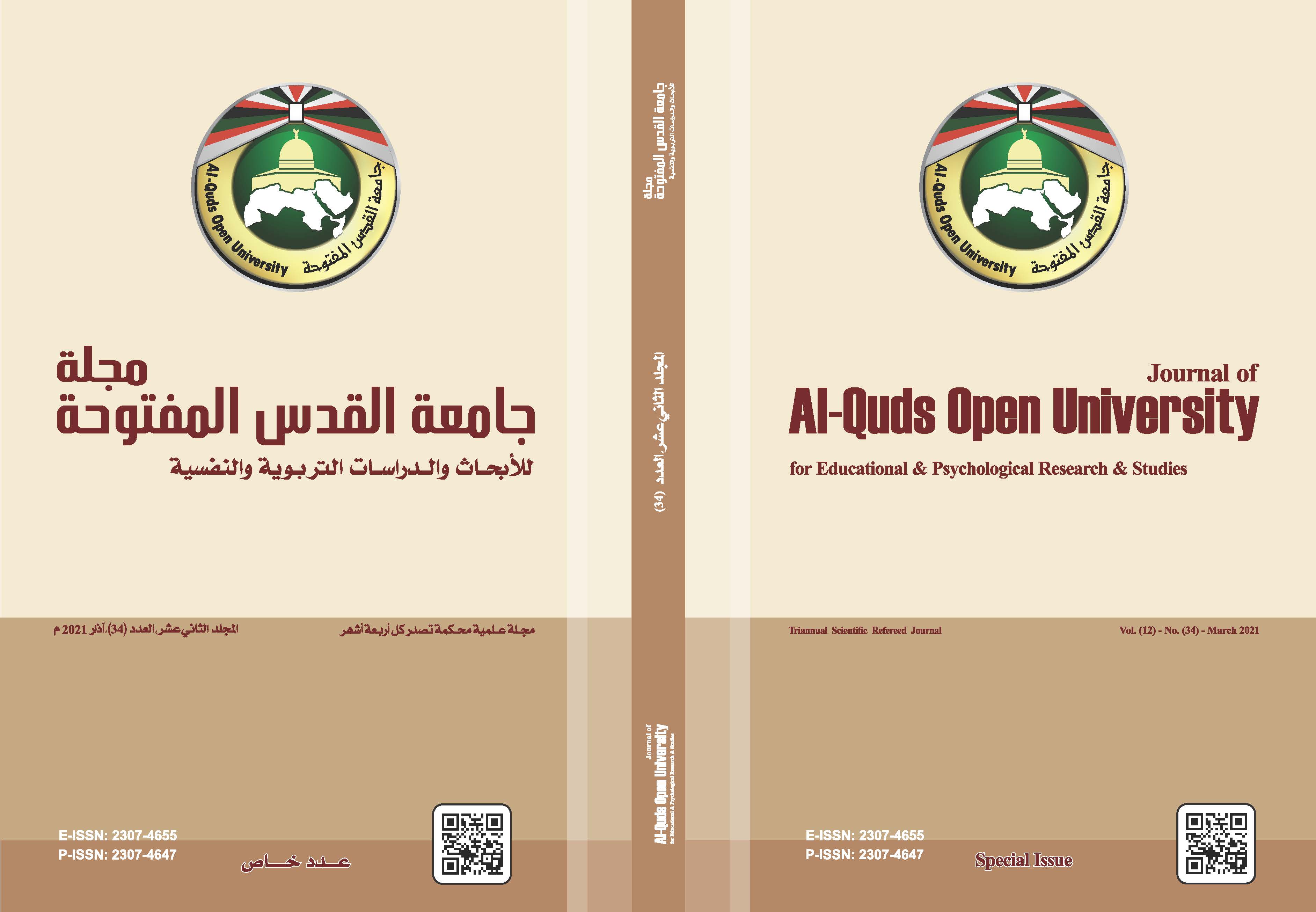القدرة التنبؤيّة لفاعليّة الذّات الانفعاليّة في العافية النّفسيّة الشّخصيّة لدى عينة من طلبة مرحلتي البكالوريوس والماجستير في جامعة الفلاح
DOI:
https://doi.org/10.33977/1182-012-034-009الكلمات المفتاحية:
فاعلية الذّات الانفعاليّة، العافية النّفسية الشّخصية، طلبة مرحلة البكالوريوس، الذّكاء الانفعاليّ.الملخص
تهدفُ الدّراسة الحاليّة إلى التَّعرُّف بمقدرة فاعليّة الذّات الانفعاليّة على التَّنبُّؤ بالعافية النّفسيّة الشّخصيّة لدى عيّنة من طلبة جامعة الفلاح في دبي. تألفت العينة من (233) طالباً وطالبة من مرحلة البكالوريوس، و(32) طالباً وطالبة من مرحلة الماجستير (MBA) في جامعة الفلاح. أظهرت النّتائج أنَّ عيّنة الدّراسة تمتلك مستوىً مرتفعاً من فاعليّة الذّات الانفعاليّة والعافية النّفسيّة الشّخصيّة. كما أشارت نتائج الدّراسة إلى أنّ زيادة مجاليْ: (استخدام وإدارة الانفعالات الذّاتيّة، وتحديد وفهم الانفعالات الذّاتيّة) من فاعليّة الذّات الانفعاليّة يزيد من العافية النّفسيّة الشّخصيّة. وتوصَّلت الدّراسة أيضاً إلى عدم وجود فروق ذات دلالة إحصائيّة عند مستوى الدّلالة (0.05 ≥ α) بين الذّكور والإناث في فاعليّة الذّات الانفعاليّة والعافية النّفسيّة الشّخصيّة. كما أظهرت النّتائج وجود فروق دالّة بين الطّلبة من تخصّصات مختلفة في بعض مجالات مقياس فاعليّة الذّات الانفعاليّة، إضافة إلى وجود فروق دالّة بين الطّلبة من المستويات الدّراسيّة المختلفة على بعض مجالات المقياس. أمّا فيما يتعلّق بمقياس العافية النّفسيّة الشّخصيّة فقد بيّنت النّتائج وجود فروق دالّة بين الطّلبة من تخصّصات مختلفة على بعض مجالات المقياس، والدّرجة الكلّيّة، ووجود فروق دالّة بين الطّلبة من المستويات الدّراسيّة المختلفة على بعض مجالات المقياس.
المراجع
المصادر والمراجع الأجنبية
- Abdel-Hadi, S. (2017). Emotional self-efficacy among a sample of faculty members and its relation to gender (Male/Female), experience, qualification, and specialization. International Education Studies, 10 (1): 211-224.
- Abu-Raiya, H., Hamama L., & Fokra, F. (2015). Contribution of religious coping and social support to the subjective well-Being of Israeli Muslim parents of children with cancer: A preliminary study. Helath & Social Work, 40 (3): 83-91.
- Adeyemo, D. & Adeleye, A. (2008). Emotional intelligence, religiosity & self-efficacy as predictors of psychological well-being among secondary school adolescent in Ogbomoso, Nigeria. Europe’s Journal of Psychology, 4 (1): Retrieved from: http://www.ejop.psychopen.eu/ar ticle/view/423/html.
- Arghode, V. (2013). Emotional and Social Intelligence Competence: Implications for Instructions. International Journal of Pedagogies and Learning, 8 (2), 66-77.
- Buker, B., Nuraydin, S., Simonsmeier, B. & Luhmann, M. (2018). Subjective well-being & academic achievement: A meta- analysis. Journal of Research in Personality 74 (1): 83-94.
- Choi. .S., Kluemper, D. & Sauley, k. (2013). Assessing emotional self-efficacy: Evaluating validity & dimensionality with cross–cultural samples. Applied Psychology: An International Review, 62 (1), 97-132.
- Dagleish, T., & Power, M. J. (1999). Handbook of cognition and emotion. New York: Wiley
- De Caroli, M. & Sagone, E. (2014). Generalized self-efficacy & well-being in adolescents with high vs. low scholastic self-efficacy. Social & Behavioral Sciences, 141 (1): 867-874.
- Diener, E. (2000). Subjective well-being: The science of happiness and proposal for a national index. American Psychologist, 55(1): 34-43.
- Diener, E. (1984). Subjective well-being. Psychological Bulletin, 95 (1), 542–575.
- Diener, E., Suh, E., Lucas, R. & Smith, H. (1999). Subjective well-being: Three decades of progress, Psychological Bulletin, 125 (2): 276-302.
- Dogan, T., Totan, T. & Sapmaz, F. (2013). The role of self-efficacy, psychological well-being, emotional self-efficacy & affect balance on happiness: A path model. European Scientific Journal, 9 (20): 31- 42.
- Goroshit, M. & Hen, M. (2014). Does emotional self–efficacy predict teachers self-efficacy & empathy. Journal of Education and Training Studies, 2 (3), 26-32.
- Kajbafnezhad, H. & Keshi, A (2015). Predicting personality resiliency by psychological well-being and its components in girl students of Islamic Azad University. Journal on Educational Psychology, 8 (4): 11-15
- Kesebir, P. & Diener, E. (2008). In defense of happiness: Why policy makers should care about subjective well-being. In L. Bruni, M. Pugno & F. Comim (Eds). Capabilities & happiness. New York: Oxford University Press.
- Lui, P. & Fernando, G. (2018). Development & initial validation of a multidimensional scale assessing subjective well-being: The well-being scale (WeBS). Psychological Reports, 121(1): 135-160.
- Maddux, J. & Vokmann, j. (2010). Self–efficacy In Hoyle, R. Handbook of Personality and Self–Regulation. UK: Wiley-Blackwell. A john Wiley and Sons.
- Maslow, A. H. (1954). Motivation and personality. New York: Harper & Row
- Onuoha, U. & Bada, O. (2016). Spirituality, self-efficacy, age & gender as predictors of psychological well-being among flood survivors in Nigeria. Journal of Humanities & Social Science, 21 (10): 43-49.
- Pool, L. & Qualter, P. (2013). Emotional self–efficacy, graduate employability, & career satisfaction: Testing the associations. Australian journal of Psychology, 65 (1), 214-223.
- Saarni, C. (1999). The Development of Emotional Competence. New York: The Guilford Press.
- Shaheen, S. & Shaheen, H. (2016). Emotional intelligence in relation to psychological well-being among students. The International Journal of Indian Psychology, 3 (4): 206 -213.
- Singh, B. & Udainiya, R. (2009). Self-efficacy & well-being of adolescents. Journal of the Indian Academy of Applied Psychology, 35 (2): 227-232.
- Siddiqui, S. (2015). Impact of self-efficacy on psychological well-being among undergraduate students. The International Journal of Indian Psychology, 2 (3): 5-16.
- Valois, R., Zullig, K., & Hunter, A. (2013). Association between adolescent ideation, suicide attempts and emotional self-efficacy. J child Fam stud, 24 (1), 237-248.
- Wheatly, D., Hardhill, I. & Bickerton, C. (2017). Subjective well-being & the organization of time. London: Rowman & Littlefield International.
التنزيلات
منشور
كيفية الاقتباس
إصدار
القسم
الرخصة
-
- الالتزام التام بأخلاقيات البحث العلمي.
- الالتزام التام بحقوق الملكية الفكرية.
- حقوق الطبع والنشر تؤول للمجلة.
- الحصول على موافقة المجلة لإعادة نشر البحوث أو ترجمتها.
- الالتزام التام بتعليمات هيئة تحرير المجلة.







2.png)






_2.png)

